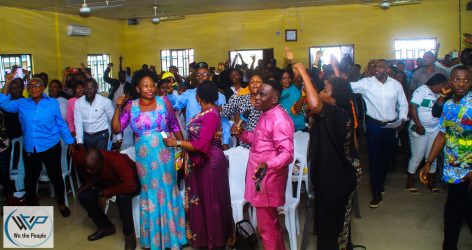On the 20th of October, 2023, We the People held a webinar with the title, “The Revolution Next Time: Police Reforms and Accountability for Atrocities Since the #EndSARS Protests”. The virtual conference aimed at examining the level of reforms that have taken place since the nationwide protests that took place in 2020. The #EndSARS protests was a culmination of several years of campaign for law enforcement accountability and police reform in Nigeria. The webinar analyzed the historical context of the Nigeria Police, failed attempts at police reforms, the triggers of the #EndSARS protest, and the government’s response to genuine citizens’ agitation captured in the protests.
Recall that the #EndSARS movement rallied around five key demands in response to continued police violence against citizens, especially young Nigerians, and the government’s inaction in addressing citizens’ concerns. These demands included ending police brutality, releasing detained protesters, ensuring justice for victims of police brutality, the establishment of an independent investigation into police misconduct, and comprehensive reforms of the Nigeria police. The conference identified that despite promises made for addressing these concerns, the government has since abandoned its commitments, and this has resulted in the deepening of the frustration and disillusionment of the Nigerian people and victims of police atrocities. The conference also observed that three years after the #EndSARS protests and the Lekki Tollgate shooting, no substantial police reforms have been made, and no form of closure have been provided by the government.
In her presentation, We the People’s Project Officer Grace Appolos, shed light on the colonial and military origins of the Nigerian police. According to her, the police was originally established by the colonialist to secure the exploitation, of indigenous people and their resources. It served the purpose of suppressing dissent, and maintaining control over the population. She went further to highlight several attempts to reform the police force, from the post-colonial military government of Aguiyi Ironsi in 1966, to the attempts by the administration of Muhammadu Buhari, and how tangible reforms have remained elusive all through. According to her, while the federal and state governments responded to the #EndSARS protests by establishing panels of inquiries at the sub national level to investigate allegations of police brutality, the findings and recommendations of these panels have largely been ignored.
In his presentation civil society activist Enefaa Georgewill reflected on the frustrations and struggles faced by the #EndSARS protesters largely due to government’s hostile response to their legitimate grievances. He further shed light on the confusion and dysfunction within Nigeria’s law enforcement agencies, emphasizing that different police units often failed to understand their specific roles, which have frequently led to overreach and abuses of power. These units often act beyond the boundaries of the law, exacerbating the already strained relationship between law enforcement and the citizens.
In his response, the Executive Director of We the People, Ken Henshaw analyzed the post #EndSARS events and stressed that the failure of the government to act on the findings and recommendations of the panels of inquiry, underscore a recurring pattern employed by the government to temporarily appease protesters and deflect attention, rather than work towards any meaningful reform.
The webinar concluded with recommendations to the Federal Government to revisit and implement the “5 for 5” demands of the EndSARS protests. It also recommended that the findings of the panels of inquiries, especially the indictment of erring police officers and compensation for victims, should be given utmost priority. Additionally, it recommended the establishment of a truth and reconciliation panel to begin the healing process and mend the rift between the government, the police, and the aggrieved Nigerian populace.




